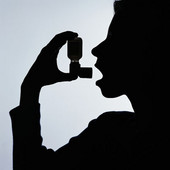
TUESDAY, July 30 (HealthDay News) — As many as one in five youngsters with asthma may grow out of the respiratory condition as they age, new research indicates.
Girls and those who are allergic to furry animals, such as dogs and cats, may be out of luck, however. The study found that remission was less likely in such children.
Swedish researchers who followed more than 200 children with asthma found that at 19 years of age, 21 percent were in remission, meaning they had no wheeze or need for inhalers. Remission was more common among boys, they found.
“Sensitization to furred animals and a more severe asthma at age 7 to 8 years were both inversely associated with remission,” said study author Dr. Martin Andersson, who is part of the Obstructive Lung Disease in Northern Sweden studies.
Still, even those allergic to furry animals with severe asthma at a young age had an 18 percent shot at remission, according to the study, published online July 29 in the journal Pediatrics.
As children with asthma grow into adulthood, many stop experiencing the shortness of breath and wheezing that characterize the chronic airway disease. Doctors will rarely say a child has outgrown asthma, because there’s always the possibility it will come back if someone is exposed to significant enough asthma triggers. Instead, they refer to someone who hasn’t had symptoms in a long time as being in remission.
The remission rate in young adults hasn’t been well studied, and reported remission rates range from 16 percent to 60 percent, the researchers noted.
To get a better idea of the actual remission rate, Andersson and his colleagues reviewed data from a study begun in 1996 in three municipalities in northern Sweden to examine asthma and its associated conditions. First- and second-grade children were invited to participate in the study.
At the start of the study, 248 children were found to have asthma, 58 percent of them boys. The children’s parents completed annual questionnaires until their children were 19. At the end of the study, 205 participants remained.
Remission was defined as parental report of no use of asthma medications in the previous 12 months on at least three annual surveys, including the final questionnaire. Persistent asthma was defined as having asthma symptoms or needing asthma medication in at least eight of nine previous questionnaires. Periodic asthma was defined as neither remission nor persistent asthma.
Overall, 21 percent were in remission, 38 percent had periodic asthma and 41 percent had persistent asthma. Out of 118 boys, about 26 percent were in remission compared to roughly 14 percent of 87 girls.
People whose asthma persisted were more likely to be allergic to cats, dogs, horses and birch trees at ages 7 to 8. The area where the children were from is a very dry climate, without dust mites, so the researchers noted that they were not able to assess how the common dust mite allergy might have affected asthma remission rates.
Those in remission and those with periodic asthma had similar reports of asthma severity, nasal inflammation and the skin condition eczema. Those who had persistent asthma had more severe asthma, experienced more nasal inflammation and eczema, according to the study.
Remission wasn’t linked to damp housing, living in a rural area or a family history of asthma, according to the study.
Parents always want to know how long their children will have asthma, said Dr. Jennifer Appleyard, chief of allergy and immunology at St. John Hospital and Medical Center in Detroit. “This study can give parents some hope, but there’s no guarantee for any child,” Appleyard said. “Really, the glass is half full. There’s a good chance you’ll outgrow it, but there’s also a good chance you won’t, especially if you have allergies, too.”
What wasn’t clear from this study, she said, was if certain treatments such as allergy shots might make a difference in whether or not someone goes into asthma remission.
What is known is that people who’ve had asthma are always potentially at risk. Even if you haven’t had symptoms in a long time, Appleyard said you should play it safe and always have an inhaler available in case you suddenly develop symptoms.
More information
Learn more about asthma from the U.S. National Heart, Lung, and Blood Institute.
Copyright © 2026 HealthDay. All rights reserved.

